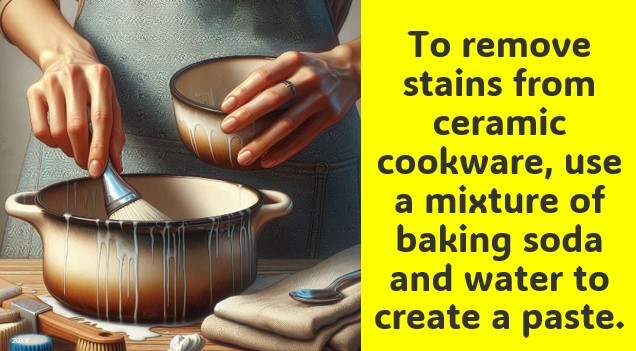To remove stains from ceramic cookware, make a paste with baking soda and water, gently scrub the surface using a non-abrasive sponge, and rinse well. For tougher stains, allow the paste to sit for a few minutes before scrubbing.
Another tip I’ve found useful is to avoid using harsh chemicals or abrasive cleaning pads. These can erode the ceramic coating over time, making the cookware more prone to staining. Stick to natural, gentle cleaning agents like baking soda, vinegar, or even lemon juice for regular maintenance.

| Method | Effectiveness | Time Required | Potential Damage |
|---|---|---|---|
| Baking soda paste (light stains) | High | 5-10 minutes | None |
| Baking soda paste (tough stains) | Very High | 15-20 minutes | None |
| Vinegar soak | Moderate | 30 minutes | Low |
| Lemon juice scrub | Moderate | 10-15 minutes | None |
| Commercial ceramic cleaner | High | 10-20 minutes | Potential coating wear |
Stains on ceramic cookware can be frustrating, but they are not impossible to remove. The key is to use gentle yet effective methods that won’t damage the ceramic coating. Based on my experience, a baking soda paste works wonders for most stains. Baking soda + water = paste that removes stains without scratching ceramics.
To remove light stains, apply the paste directly to the stained area. Wait for 5 to 10 minutes and then scrub gently with a soft sponge. Rinse with warm water to reveal a clean surface. For tougher stains, I suggest allowing the paste to sit for 15 minutes and applying more pressure when scrubbing to get the best results. If needed, repeat the process until the stain is completely gone.
Common Causes of Stains
Cooking Ingredients
Certain ingredients can leave persistent stains on ceramic cookware. Tomato sauce, for instance, contains acids and pigments that can cling to the ceramic surface, leading to noticeable discoloration. Turmeric, with its bright yellow hue, is another common culprit, as its color can be challenging to remove. Oils, especially those used in frying or sautéing, can also contribute to staining if not cleaned off promptly.
High Heat
Using ceramic cookware on high heat can result in discoloration and scorch marks. The high temperatures can cause oils and food residues to burn onto the surface, leading to unsightly marks. Over time, repeated exposure to high heat can degrade the ceramic coating, making it more susceptible to staining.
Improper Cleaning
Improper cleaning techniques can exacerbate staining issues. Avoid using abrasive scrubbers or harsh chemicals on the ceramic coating to prevent scratches and damage that can affect the appearance and make it more likely for stains to set in. Using overly aggressive cleaning methods can strip away the protective layer, leaving the surface more vulnerable to discoloration and damage.
Removing Process Stains from Ceramic Cookware
Mild Cleaning Methods
Baking Soda and Water Paste
Ingredients:
- 1/4 cup baking soda
- 2-3 tablespoons of water
Instructions:
- Mix baking soda and water to form a thick paste.
- Apply the paste to the stained areas of the cookware.
- Let it sit for 15-20 minutes to allow the paste to penetrate the stains.
- Gently scrub with a soft sponge or cloth in circular motions.
- Rinse thoroughly with warm water and dry with a clean towel.
Benefits:
- Baking soda is a mild abrasive, helping lift stains without scratching the ceramic surface.
- It is safe for most types of ceramic cookware, making it a versatile option.
Vinegar and Baking Soda
Ingredients:
- 1/2 cup white vinegar
- 1/4 cup baking soda
Instructions:
- Pour white vinegar over the stained areas of the cookware.
- Sprinkle baking soda on top of the vinegar.
- Allow the mixture to fizz and bubble for 10-15 minutes, which helps to break down the stains.
- Gently scrub with a soft sponge or cloth to lift the stains.
- Rinse thoroughly with warm water and dry with a clean towel.
Benefits:
- The fizzing action from the vinegar and baking soda combination helps to lift and break down stains effectively.
- Both vinegar and baking soda are non-toxic, making them safe for regular use.
Commercial Cleaners
Products to Consider:
- Cerama Bryte Cooktop Cleaner
- Bar Keepers Friend Cookware Cleaner
Instructions:
- Apply a small amount of the chosen cleaner to the stained areas of the cookware.
- Follow the manufacturer’s instructions for application and usage.
- Gently scrub with a non-abrasive sponge or cloth to avoid scratching.
- Rinse thoroughly with warm water and dry with a clean towel.
Benefits:
- These commercial cleaners are formulated specifically for cookware and can effectively remove tough stains.
- They often provide quick and visible results, making them ideal for more stubborn stains.
Preventative Measures
Proper Usage
Tips:
- Avoid Using High Heat Settings: Ceramic cookware is designed to handle moderate heat. Using high heat can cause discoloration and scorch marks. Always use medium to low heat to maintain the integrity of the ceramic surface.
- Use Utensils Safe for Ceramic Surfaces: Opt for wooden, silicone, or plastic utensils to avoid scratching the ceramic coating. Metal utensils can damage the surface and make it more prone to staining.
Regular Maintenance
Tips:
- Clean Your Cookware After Each Use: Wash your cookware promptly to prevent residue buildup. This helps avoid stubborn stains and keeps your cookware looking fresh.
- Use Gentle Cleaning Methods: To preserve the ceramic coating, stick to mild abrasives and non-abrasive sponges. Harsh chemicals and abrasive scrubbers can scratch the surface and increase staining.
Comparison of Cleaning Methods
| Method | Effectiveness | Time Required | Ease of Use |
|---|---|---|---|
| Baking Soda and Water Paste | Good | 15-20 minutes | Easy |
| Vinegar and Baking Soda | Excellent | 10-15 minutes | Moderate |
| Commercial Cleaners | Very Good | Varies | Easy |
Troubleshooting Stubborn Stains
Stubborn Food Residue
Method:
- Apply a Mixture of Equal Parts Vinegar and Water: Combine equal parts of white vinegar and water, then pour the mixture over the stained area.
- Let It Sit: Allow the solution to sit for 20-30 minutes to break down the residue.
- Gently Scrub: Use a non-abrasive sponge to scrub the area gently, focusing on lifting the stain without damaging the ceramic surface.
- Rinse and Dry Thoroughly: Rinse the cookware with warm water to remove any residue, then dry it with a clean towel.
Tips:
- You may need to repeat the process for particularly tough stains to achieve the desired results.
Burnt Residues
Method:
- Create a Paste: Mix 1/4 cup of baking soda with a few tablespoons of water to form a thick paste.
- Apply the Paste: Spread the paste over the burnt residue on the cookware.
- Let It Sit: Allow the paste to sit for 30-60 minutes to loosen the burnt residue.
- Scrub Gently: Use a soft sponge to scrub the area gently, focusing on removing the burnt residue without scratching the surface.
- Rinse and Dry Thoroughly: Rinse the cookware with warm water and dry it thoroughly with a clean towel.
Tips:
- If the paste alone is ineffective, consider using a commercial cleaner specifically designed for burnt residues for better results.
Effectiveness of Various Cleaning Products
| Product | Effectiveness | Price Range | Best For |
|---|---|---|---|
| Baking Soda | Good | Low | General Stains |
| Vinegar | Good | Low | General Stains |
| Cerama Bryte Cooktop Cleaner | Very Good | Moderate | Tough Stains |
| Bar Keepers Friend Cookware Cleaner | Excellent | Moderate | Burnt Residues |
How Do I Remove Stubborn Stains from Ceramic Cookware?
To remove stubborn stains from ceramic cookware, start by soaking the cookware in warm, soapy water for at least 30 minutes. This helps to loosen any food particles and stains. After soaking, use a non-abrasive sponge or cloth to gently scrub the stained areas. If the stains persist, create a paste using baking soda and water, then apply it directly to the stains. Let the paste sit for about 15 minutes before scrubbing again. Rinse thoroughly with warm water and dry with a clean towel.
Can I Use Vinegar to Clean Ceramic Cookware?
Yes, vinegar can be used to clean ceramic cookware effectively. Vinegar is a natural acid that helps to break down stains and remove any lingering odors. To use vinegar, mix equal parts of white vinegar and water and pour the solution into the stained cookware. Heat the mixture on the stove until it starts to simmer, then remove it from the heat and let it sit for 10-15 minutes. Afterward, pour out the vinegar solution, and scrub the cookware with a non-abrasive sponge. Rinse well and dry completely.
Is It Safe to Use Baking Soda on Ceramic Cookware?
Baking soda is safe to use on ceramic cookware. It is a gentle abrasive that can effectively remove stains without damaging the ceramic surface. To clean with baking soda, sprinkle a small amount directly onto the stained area and add a little water to form a paste. Use a soft sponge to scrub the stains in a circular motion. Baking soda is particularly useful for removing tough, baked-on stains. Always rinse the cookware thoroughly after cleaning to remove any residue.
Can I Use Hydrogen Peroxide to Remove Stains from Ceramic Cookware?
Hydrogen peroxide can be an effective stain remover for ceramic cookware, especially for stubborn stains. To use, pour a small amount of hydrogen peroxide directly onto the stained area. Let it sit for 10-15 minutes to allow the peroxide to break down the stain. After the waiting period, scrub the area with a non-abrasive sponge or cloth. Rinse the cookware thoroughly with warm water to remove any remaining hydrogen peroxide and dry it completely before storing.
What Should I Avoid When Cleaning Ceramic Cookware?
When cleaning ceramic cookware, avoid using harsh abrasives like steel wool or metal scouring pads, as these can scratch and damage the ceramic surface. Additionally, avoid using bleach or other harsh chemicals, as they can weaken the ceramic glaze over time. Instead, stick to gentle cleaners like baking soda, vinegar, and mild dish soap. It’s also best to avoid using extremely hot water, as sudden temperature changes can cause the ceramic to crack.
How Can I Prevent Stains on Ceramic Cookware?
Preventing stains on ceramic cookware involves regular maintenance and proper use. Always clean your cookware promptly after use to prevent food residue from drying and staining the surface. When cooking, use a medium or low heat setting, as high heat can cause food to burn and stick to the ceramic, leading to stains. Additionally, consider using a small amount of oil or butter to create a nonstick barrier between the food and the ceramic surface. Regularly seasoning your ceramic cookware can also help maintain its nonstick properties and prevent staining.
Final Decision
Removing stains from ceramic cookware involves a combination of regular maintenance and targeted cleaning methods. You can keep your cookware in excellent condition by using mild, non-abrasive cleaners like baking soda and vinegar or opting for commercial products when needed. Preventative measures, such as avoiding high heat and using proper utensils, can help minimize staining and prolong the life of your ceramic cookware.
By following these tips and techniques, you can maintain the beauty and functionality of your ceramic cookware for years to come.

I may be a little “crazy” when it comes to cooking, but I enjoy every minute of it. Spending time in the kitchen itself, whether with my family or my friends, brings me both happiness and exhilaration. This blog was created to showcase my cooking/eating with family and friends. And also as an opportunity to discuss ideas on food and the culinary circle in general.




